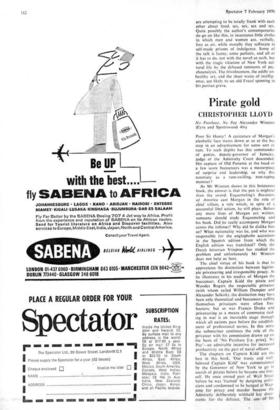Pirate gold
CHRISTOPHER LLOYD
No Purchase, No Pay Alexander Winston (Eyre and Spottiswood 40s)
Poor Sir Henry! A caricature of Morgan's alcoholic face stares down at us at the bus stop in an advertisement for some sort of rum. To such depths has this commander of genius, deputy-governor of Jamaica. judge of the Admiralty Court descended. His capture of Old Panama at the head of a few score buccaneers was a masterpiece of surprise and leadership, so why this notoriety as a rum-swilling, nun-raping monster?
As Mr Winston shows in this boisterous book, the answer is that the pen is mightier than the sword. Esquemeling's Bucaaiers of America cast Morgan in the role of chief villain, a role which, in spite of a successful libel action, he still plays. Before any more lives of Morgan are written. someone should study Esquemeling and his book. Did he really accompany Morgan across the isthmus? Why did he dislike him so? What nationality was he, and who was responsible for the anglophobe accretions in the Spanish edition from which the English edition was translated? Only the Dutch historian Vriejman has studied the .problem and unfortunately Mr Winston does not help us here.
The chief virtue of his book is that he appreciates the distinction between legitim- ate privateering and-irresponsible piracy. As he illustrates in his studies of Morgan the buccaneer. Captain Kidd the pirate and Woodes Rogers the respectable privateer
(with whom sailed William Dampier and Alexander Selkirk), the distinction may have been only theoretical and buccaneers calling themselves privateers were often free- booters; but so was Francis Drake and privateering as a means of commerce raid- ing in war is an inevitable stage through which all nations pass before the establish- ment of professional navies. In this sense the submariner continues the role of the privateer with his commission drawn up on the basis of 'No Purchase [i.e. prize], No Pay'—an admirable incentive for increased productivity on the part of naval officers.
The chapters on Captain Kidd are the best in this book. 'Our trusty and well- beloved Captain Kidd' was commissioned by the Governor of New York to go in search of pirates before he became one him- self. He once owned part of Wall Street before he was 'framed' by designing politi- cians and condemned to be hanged at Wap-
ping for piracy and murder because the Admiralty deliberately withheld key docu- ments for the defence. The site of his
treasure has always been an American in- terest. As a fellow American, Mr Winston writes: 'The more occult have searched with Bible and key, sieve and shears, hazel wand, incantations, while business corporations, lacking the psychic gift, resorted to dredges and dynamite. By one means or another they have scoured the Atlantic coast from Nova Scotia to Key West, and the treasure was usually Kidd's.'
But he does not mention the fate of the actual f10,000 Kidd brought back with him when he was summoned to stand his trial in London. The newly-founded Royal Hos- pital at Greenwich petitioned Queen Anne for the balance of the money to purchase the Queen's House, now the National Mari- time Museum. We who are the beneficiaries of such transactions can only adopt the sympathetic attitude of Gil Blas, the proto- type of the picaresque hero: 'All men love to take what belongs to others; it is a uni- versal desire; only the manner of doing it differs.'



































 Previous page
Previous page